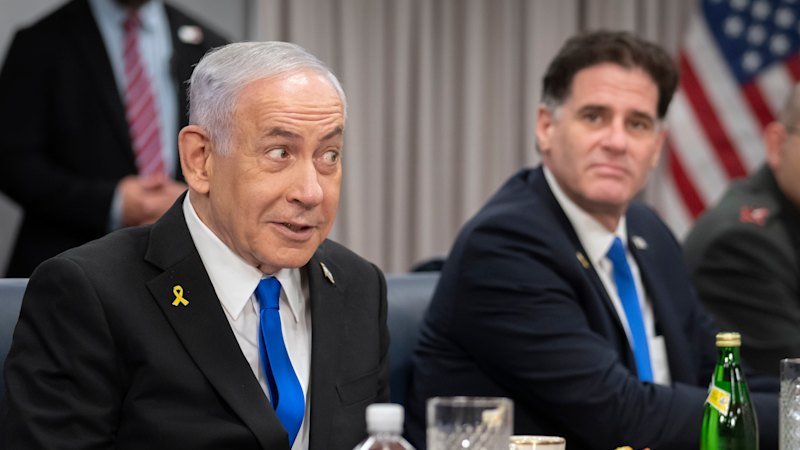
Israeli Prime Minister Benjamin Netanyahu and US President Donald Trump both indicated on Friday that negotiations with Hamas have effectively stalled. They stated that the Palestinian militant group seems unwilling to pursue a deal, prompting Israel to consider “alternative” strategies to secure the release of hostages taken during the ongoing conflict. Trump’s remarks suggested a shift towards a more aggressive stance, stating that Hamas leaders would be “hunted down.”
This development signals a bleak outlook for any immediate resumption of ceasefire negotiations, especially as international concerns mount over the deteriorating humanitarian crisis in Gaza. The ongoing conflict, which has resulted in significant loss of life and widespread hunger, remains a pressing issue for global leaders.
International Reactions and Humanitarian Crisis
In response to the worsening situation, French President Emmanuel Macron announced that France would be the first significant Western nation to recognize an independent Palestinian state. This recognition comes as Britain and Germany maintain a more cautious stance, with neither country ready to follow suit.
Meanwhile, Australian Prime Minister Anthony Albanese expressed strong criticism of Israel’s actions in Gaza, and Foreign Minister Penny Wong suggested that Australia may consider recognizing Palestine at the United Nations in September.
The backdrop to these developments includes the withdrawal of Israeli and US delegations from ceasefire talks in Qatar on Thursday, shortly after Hamas submitted its response to a truce proposal. Initially, sources indicated that the withdrawal was for consultations, but Netanyahu’s statements suggested a more hardened Israeli position.
US envoy Steve Witkoff attributed the impasse in negotiations to Hamas, a sentiment echoed by Netanyahu. In contrast, senior Hamas official Basem Naim criticized Witkoff’s remarks, claiming that the talks had been constructive and could lead to a resolution if Israel had a genuine willingness to negotiate.
The proposed ceasefire aimed to suspend hostilities for 60 days, allowing humanitarian aid into Gaza and facilitating the release of hostages in exchange for Palestinian prisoners. However, disagreements over troop withdrawal and future agreements beyond the ceasefire period have stalled progress.
Humanitarian Aid and Military Actions
As the talks falter, international aid organizations report that mass hunger has taken hold among Gaza’s 2.2 million residents. Following the halting of supplies in March and subsequent reopening under strict conditions, resources are now critically low. The Israeli military announced on Friday that it would allow countries to airlift aid into Gaza, a move that Hamas dismissed as insufficient.
“The Gaza Strip does not need flying aerobatics; it needs an open humanitarian corridor and a steady daily flow of aid trucks to save what remains of the lives of besieged, starving civilians,” stated Ismail Al-Thawabta, director of the Hamas-run media office.
Reports from Gaza indicate that nine more Palestinians died from starvation or malnutrition in the past 24 hours, exemplifying the dire situation as dozens have perished in recent weeks. Israel contends that it has permitted sufficient aid into Gaza, accusing the United Nations of failing to distribute it effectively.
Despite these claims, UN agencies report that supplies of specialized therapeutic food for children suffering from severe malnutrition are running critically low. The humanitarian crisis unfolds against the backdrop of continuing Israeli military offensives, with Palestinian health officials reporting at least 21 fatalities from airstrikes and gunfire on Friday, including five victims in a strike on a school sheltering displaced families.
In a poignant moment, residents of Gaza City carried the body of journalist Adam Abu Harbid through the streets, highlighting the risks faced by those covering the conflict. Colleagues at the funeral voiced concerns over the targeting of journalists, with Mahmoud Awadia stating, “We will continue this message of exposing the crimes of the Israeli occupation.”
Israel initiated its military campaign in Gaza following a Hamas-led attack on October 7, 2023, that resulted in approximately 1,200 Israeli deaths and the capture of 251 hostages. Since then, reports indicate that nearly 60,000 people have died in Gaza due to the conflict.
The recognition of Palestinian statehood by Macron has drawn criticism from Israel and the US, with Netanyahu describing it as a “reward for terrorism.” Western nations have historically supported the notion of a Palestinian state, but have emphasized that it should emerge from a negotiated peace process.
In contrast, Britain and Germany have made it clear that there are no imminent plans to recognize Palestinian statehood. Germany’s longstanding support for Israel, rooted in its historical context, and Britain’s alignment with US policy reflect the complexities surrounding this issue. A German government spokesperson reiterated that “Israel’s security is of paramount importance,” indicating that recognition of Palestine will not occur in the short term.
As the international community grapples with the unfolding crisis, the focus remains on alleviating the extreme suffering in Gaza, which has reached alarming levels amidst ongoing hostilities.






